In the food and beverage industries, the quality of compressed air must be absolute as the air often comes into direct contact with food products and production equipment. However, many of the factors affecting quality often receive little attention.
Compressed air is a necessity for many processes of the food and beverage industries. It is used to power mechanical machinery but also for cutting, drying and cooling.



/Sarlin%20-%20Yritysvalokuvat%20-%20full-2.jpg)

/K%C3%A4sitellyt%2006%202024/Paineilma2024-turbo-ohjaus-huolto-s%C3%A4%C3%A4t%C3%B6-Balance-10.jpg)
/6X3A5970_Photo_PasiSalminen_com.jpg)